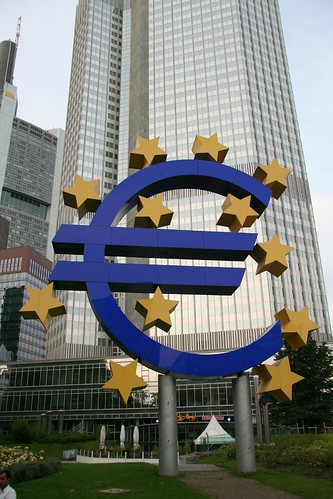After the
collapse of the EU budget talks this week, Barroso was
clearly dissapointed with a small group of countries that fought against increasing the EU parliament's budget. One of these countries was Sweden, together with the UK and the netherlands. To the Swedish minister of finance, it was irresponsible to expand spending while European states are slashing expences. To Barroso, and the MEP's, it is pennywise to try to build an integrated Europe without money.
To me, the differing opinions are less interesting than the fact that they differ. Maladets! has long since noted a growing rift between the Swedish liberal right government and European institutions. It has been about
Israel and
the Euro. More recently the EU directive on maternity leave was
heavily critizised by Swedish liberals in the government and in the press.
For the Swedish left, it is easy to sarcastically label the EU-weary liberal right as nationalists and inward looking. In deed - the Swedish right wing has historically been very quick to label anyone who questions EU policies as a nationalist, so it might not be more than fair that they are judged by their own standards, but I don not think this is a correct analysis.
The Swedish liberal right is not inward looking, and they are fond of European integration. It is not just for show that
the liberal party is the only Swedish party to seriously campaign for euro membership. Moreover, the Swedish government is far from isolated when its opinions run counter to Bruxelle's. As Barroso pointed out, there was a number of countries who opposed the EP on this issue. A number of countries, who tend to think the same in European debates. So it is rather about conflicting visions about europe, where continental Europe (read: France) stands against the north western periphery, like the UK and Scandinavian member states. And Germany lingers somewhere in the middle.
The issue at hand - what resources should the European parliament reign over, is emblematic. The Cameron-Reinfeldt axis in the north west seem to favour a Europe with a downsized bureaucracy, that decides as little as possible. Its foremost function is to make sure that member states are not unduelly distorting competition. It is easy to see the contours of a
neo liberal night watchman state, but we must admit that this vision also allows for any social policies, as long as they are administered on a national - not European - level.
On continental Europe, the push for a more active EU seems much stronger. I can imagine that there are different forces at play here. One is the more ambitious franco-german vision of the European union, that sees national legislation and bureaucracy replaced with a European legislation and bureaucracy, that is bascially the same thing on a bigger scale. As an example, the Euroepan Union is already involved in a great deal of projects that a night watcher state would shun. For example, many readers will be familiar with
the Youth in Action programme, in which the European Union finances thousands of volunteers every year with the direct ambition of spurring social change - creating a European consciousness among the continent's youth.
If we compare this vision of the EU, with the north western idea of a night watchman state, it is very easy to recognise an old historical heritage. Whereas the british isles spawned liberals like J.S Mill, Adam Smith and Spencer, continental Euope fostered ideolgies like Marx's socialism and Durkheim's organic solidarity.
But maybe more relevant than historical precurrents, is the fact that different countires expect very different things from the EU. Some contries, like the Scandinavian, percieve themselves as wealthier than the EU at large, and are so according to economist's common sense. For a cynic, it is easy to see how Sweden would pay money to an EU budget but less clear what Swedes would benefit.
On the other hand, there are a whole lot of Euroepan countries who perceive themesleves as, and are, less wealthy than the EU at large. In these countries, social policies are hard to find because they are difficult to fund. An enlarged EU budget, and wider responsibilites for the Union, might well mean a great improvement for citizens' welfare in poorer EU countries.
In
today's Sydsvenskan, the editor in chief notes that the collapsing bugdget talks will seem like a friendly chat compared to the upcoming talk about agricultural subsidies. Here enormous economical interests clash with strong ideological convictions, and it is a safe bet that Sweden and the UK will be on the same side against France again.
Crises come,a dn crises go - and the Union will survie also this row, of course. But if the counterparts in the same in row after row, the European Union might at one point seem like a confederation of wider regions, not a federation of national states. But maybe that is a natural development? It is interesting to ponder.











